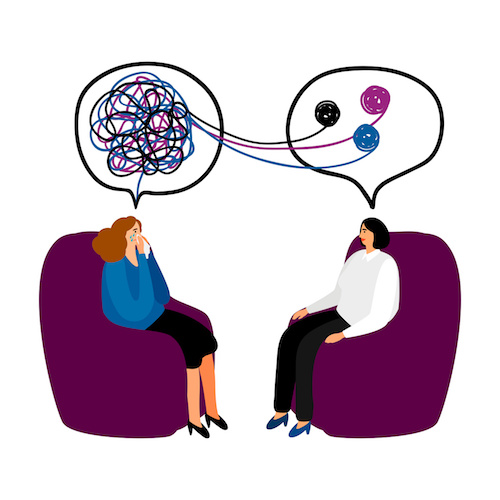A Practical Guide to Starting Cognitive Behavioural Therapy for the First Time
The Relevance of Mental Health And Wellness: a Deep Dive Into Counseling, Therapy, and Their Benefits
Psychological health substantially forms specific well-being, influencing behaviors, emotions, and ideas. Therapy and treatment work as vital methods for healing and personal growth. They supply structured assistance, helping individuals browse life's obstacles. Yet, many continue to be not aware of the details sorts of therapy offered and their distinct advantages. Understanding these facets is very important for anyone considering professional mental wellness assistance. What follows may illuminate courses to strength and gratification that many neglect.
Understanding Mental Health and Its Impact
Psychological wellness is usually forgotten, it plays a necessary duty in total well-being and day-to-day performance - Marriage Counselling. It includes emotional, mental, and social factors that influence just how individuals believe, feel, and act. A person's mental health directly influences their ability to take care of tension, associate with others, and make options. Poor mental wellness can result in different problems, consisting of anxiety, anxiety, and trouble in preserving partnerships, all of which can impede expert and individual growth.Furthermore, psychological wellness has far-reaching implications for physical health. Chronic stress and untreated mental conditions can add to various physical disorders, such as cardiovascular disease and deteriorated immune actions. On the other hand, favorable psychological health promotes durability, enabling individuals to deal with life's challenges efficiently. Comprehending psychological health and wellness's significance is important for fostering encouraging atmospheres that promote psychological wellness, consequently improving the lifestyle for communities and individuals alike
The Various Types of Therapy and Therapy
In the domain of psychological wellness, different counseling and therapy kinds satisfy varied needs. Private therapy techniques concentrate on individual problems via individually sessions, while group treatment dynamics foster shared experiences and support amongst individuals. Recognizing these techniques is necessary for picking the proper intervention for different challenges.
Private Therapy Techniques
Countless individual counseling techniques exist, each designed to attend to details mental wellness issues and accommodate varying customer needs. Cognitive Behavioral Treatment (CBT) concentrates on determining and transforming adverse thought patterns, while Psychodynamic Therapy checks out previous experiences and unconscious processes. Humanistic Treatment stresses personal growth and self-actualization, fostering an encouraging setting. Interpersonal Treatment (IPT) targets relationship issues and communication patterns to enhance emotional wellness. Furthermore, Acceptance and Commitment Therapy (ACT) motivates clients to approve their ideas and feelings while dedicating to individual worths. Each strategy supplies distinct methods and ideologies, permitting specialists to customize their approaches to the individual, thus improving the therapeutic experience and advertising psychological health recuperation.
Team Treatment Dynamics
Group treatment characteristics include various healing strategies that leverage the power of shared experiences and social connections. This type of treatment typically consists of varied groups, promoting a risk-free atmosphere for individuals to reveal ideas and feelings. Key kinds of team therapy consist of support system, which supply emotional assistance; process-oriented groups, concentrating on social communications; and psychoeducational teams, targeted at giving knowledge regarding psychological health and wellness issues. The characteristics within these teams can improve self-awareness, as participants often assess their habits in relation to others. Furthermore, group treatment promotes a sense of belonging, lowering sensations of isolation. Through shared narratives and cumulative analytical, participants can establish coping strategies and gain insights, ultimately contributing to specific development and recovery.
The Role of Therapy in Mental Health
Counseling plays an important role in psychological health by using numerous approaches customized to specific requirements. These methods give specialist assistance that can cause substantial improvements in emotional health. Recognizing the various kinds of therapy can aid individuals make notified choices concerning their psychological health and wellness care.

Kinds of Counseling Techniques
While different counseling strategies exist, each deals distinct approaches and understandings right into mental health and wellness treatment - Mental Health Resources. Amongst one of the most popular are cognitive-behavioral therapy (CBT), which concentrates on modifying negative thought patterns; psychodynamic therapy, which explores subconscious procedures and childhood experiences; and humanistic techniques, emphasizing individual development and self-actualization. Furthermore, solution-focused brief therapy focuses on finding solutions in today as opposed to delving into issues. Team therapy fosters area and shared experiences, while family members treatment addresses relational dynamics within domestic structures. Each method accommodates various demands, lining up with private preferences, issues, and healing goals. Recognizing these approaches aids customers make educated choices regarding their mental health and wellness trip and advertises reliable treatment tailored to their special conditions
Benefits of Expert Advice
Various individuals take advantage of expert advice in managing their mental health and wellness difficulties. Therapy provides a safe area for customers to discover their thoughts and sensations without judgment. This therapeutic atmosphere fosters self-awareness, allowing people to determine patterns in their behavior and create healthier coping approaches. Specialist advice also offers access to evidence-based strategies that can ease signs of anxiety, depression, and other mental health problems. Counselors can aid in setting realistic objectives and offer support in accomplishing them, improving overall well-being. The collaborative partnership between counselor and customer is important, as it advertises responsibility and urges personal growth. Eventually, professional support plays a vital duty in guiding psychological health and wellness trips, resulting in improved emotional resilience and life complete satisfaction.
Benefits of Treatment: Healing and Development

Exactly how to Pick the Right Specialist or Therapist
Exactly how can one Cognitive Behavioural Therapy navigate the usually overwhelming procedure of selecting the right specialist or therapist? Determining individual requirements is vital; individuals need to consider their certain problems, whether connection, depression, or stress and anxiety challenges. It is valuable to research various restorative strategies, such as cognitive-behavioral treatment or psychodynamic treatment, to locate a suitable match.Next, possible clients should look for recommendations from relied on resources or utilize on-line directories. It is important to examine therapists' credentials, including their education, licensing, and locations of specialization. Setting up preliminary examinations can aid gauge compatibility, allowing people to assess communication designs and personal comfort.Finally, logistical aspects, such as place, availability, and costs, need to additionally be considered. By thoughtfully weighing these elements, one can make an informed choice, ultimately fostering a healing connection that supports mental health and individual development.
Getting Rid Of Preconception: Embracing Mental Wellness Support
While social mindsets toward psychological health have actually developed, preconception still presents a considerable barrier for lots of seeking support. This preconception frequently manifests as mistaken beliefs surrounding mental disease, leading individuals to feel embarassment or fear concerning their struggles. Many individuals hesitate to pursue counseling or treatment due to worries concerning being evaluated or classified. Overcoming this preconception is fundamental for promoting an encouraging setting where people can honestly discuss their psychological wellness needs.Communities and companies play an important function in this makeover by promoting awareness and education regarding mental wellness issues. Campaigns that highlight individual tales can humanize these experiences, encouraging others to look for assistance without concern. As acceptance expands, people might really feel much more equipped to accept psychological health support, recognizing it as an essential element of overall health. By dismantling preconception, culture can grow a society of understanding, concern, and proactive psychological healthcare.
Strategies for Keeping Mental Wellness Outside of Therapy
Although treatment supplies valuable support, keeping mental health beyond sessions is just as crucial. People can carry out a number of approaches to sustain their psychological health and wellness. Normal physical activity plays a crucial duty, as workout promotes the release of endorphins, which improve mood. Furthermore, a well balanced diet plan abundant in nutrients can greatly impact emotional stability and energy levels.Practicing mindfulness and reflection assists individuals take care of stress and create better self-awareness. Developing a constant rest regimen is also essential, as top quality rest is crucial for cognitive function and psychological regulation.Engaging in social activities promotes link and decreases feelings of isolation. Seeking hobbies or interests can supply an innovative electrical outlet and boost self-esteem. Lastly, exercising and setting practical goals self-compassion permits individuals to cultivate resilience. By integrating these approaches right into life, individuals can efficiently support their psychological well-being past therapy sessions.
Frequently Asked Questions

How Can I Tell if I Need Treatment?

Identifying the demand for treatment often entails identifying consistent sensations of unhappiness, anxiety, or frustrating tension. If day-to-day working comes to be tough or coping mechanisms stop working, looking for expert support might be a beneficial advance.
What Should I Expect in My First Treatment Session?
In the first treatment session, individuals can expect an intro, discussion of their factors for seeking help, and an overview of the specialist's method, developing a foundation for future discussions and establishing comfort in the restorative space.
Are Online Therapy Sessions as Effective as In-Person Ones?
Study shows that online therapy sessions can be as effective as in-person ones. Factors such as the specialist's certifications, client engagement, and the healing relationship substantially influence end results, no matter the tool used.
Can Treatment Assist With Relationship Problems?
Therapy can aid people in dealing with connection concerns by offering tools for interaction, recognizing emotions, and fixing problems. Mental Health Resources. It advertises much healthier characteristics and encourages individual growth, inevitably cultivating stronger, a lot more fulfilling connections between partners
For How Long Does Therapy Typically Last?
Treatment period differs significantly based on individual demands and goals. Generally, sessions may last from a few weeks to numerous months, with some individuals engaging in ongoing therapy to resolve long-lasting issues and individual growth. Cognitive Behavioral Therapy (CBT) focuses on recognizing and changing negative thought patterns, while Psychodynamic Therapy checks out previous experiences and subconscious processes. Trick kinds of group treatment include assistance groups, which offer emotional support; process-oriented teams, concentrating on interpersonal interactions; and psychoeducational teams, intended at imparting expertise about mental health and wellness problems. Amongst the most noticeable are cognitive-behavioral therapy (CBT), which focuses on changing adverse thought patterns; psychodynamic treatment, which discovers unconscious procedures and childhood experiences; and humanistic techniques, emphasizing individual growth and self-actualization. Team treatment cultivates community and shared experiences, while household treatment addresses relational dynamics within domestic frameworks. It is valuable to research study various restorative strategies, such as cognitive-behavioral therapy or psychodynamic treatment, to discover a suitable match.Next, prospective clients must look for referrals from trusted sources or utilize on-line directories.